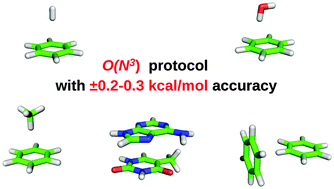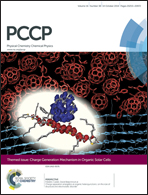Quantum Monte Carlo for noncovalent interactions: an efficient protocol attaining benchmark accuracy
Abstract
Reliable theoretical prediction of noncovalent interaction energies, which are important e.g. in drug-design and hydrogen-storage applications, is one of the longstanding challenges of contemporary quantum chemistry. In this respect, the fixed-node diffusion Monte Carlo (FN-DMC) method is a promising alternative to the commonly used “gold standard” coupled-cluster CCSD(T)/CBS method due to its benchmark accuracy and favourable scaling, in contrast to other correlated wave function approaches. This work is focused on the analysis of protocols and possible trade-offs for FN-DMC estimations of noncovalent interaction energies, and proposes an efficient yet accurate computational protocol using simplified explicit correlation terms with a favorable O(N3) scaling. It achieves results in excellent agreement (mean unsigned error ∼0.2 kcal mol−1) with respect to the CCSD(T)/CBS data on a number of complexes, including benzene/hydrogen, the T-shape benzene dimer, stacked adenine–thymine complex and a set of small noncovalent complexes (A24). The high accuracy and reduced computational costs predestinate the reported protocol for practical interaction energy calculations of large noncovalent complexes, where the CCSD(T)/CBS is prohibitively expensive.


 Please wait while we load your content...
Please wait while we load your content...